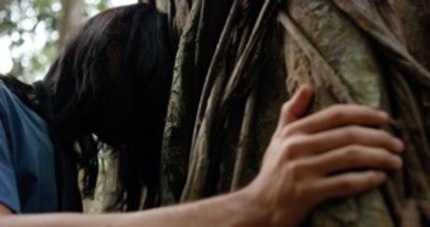Sitges 09: NYMPH Review

The post-viewing reflection on Pen-Ek Ratanaruang's (Last Life in the Universe, 6ixty9) latest film, a creepy languid drama called Nymph is actually better than the film itself. I happen to quite like the directors fish-out-of-water scenarios and lengthy silent reflections en route. Instead of Tadanobu Asano (albeit, Jayanama Noachai's performance is quite reminiscent of the famous Japanese actor) fleeing the country for one reason or another, we are given one of these implacable nature stories with long shots of blowing branches and spiritually haunted trees (note for those attending TIFF, there are only loose parallels to Lars von Trier's Antichrist, and one of them is the striking 'sex in the roots of the tree' which is almost exact duplicate of the image (and I am sure one of those weird parallel co-incidences), except here the 'evil lass' is on top.
Nop and May have been married long enough that their relationship has fallen into a sex-free malaise, and May has been secretly having intimate after-hours trysts with her boss. On a camping vacation (perhaps Nop's attempt to get May back to nature and off the pharmaceuticals, but the film drops this subplot quickly enough), Nop gets lost in the woods and separated from his wife while taking photos of a very strange looking tree. When the absence stretches past a day, May calls the park rangers; a competent enough pair who have encountered several of these disappearances, to the point where they have sort of lost track of the number of hikers and tourists who they cannot locate in the sprawling park. One of them has a warding charm around his neck to keep the forest spirits at bay. We know there actually are malicious spirits in this forest from the dynamite opening shot of the film, which lasts almost an entire reel in a single take shot. The bit of showy (but effective) camerawork starts the film off with a visceral kick that the director has no interest in really following up. Instead, Nymph becomes more of an Edgar Allen Poe tale of infidelity, and guilt manifesting itself in the titular forest creature (earthy, nude, fierce). Things get interesting when Nop shows back up randomly in their apartment with an obsession for plants and now living on a diet of only water.
Not overly interested in jump scares or horror tropes (although May does venture into the dark on several occasions, it is more implacable than scary), instead the film becomes a symbol-heavy meditation on infidelity and how one can perhaps fall back in love in the wake of a large enough calamity. The ending is ambiguous enough to underscore that the future is probably going to be ugly, but perhaps still salvageable if all parties learn from the experience.
The movie requires a fair bit of patience, and Pen-Ek Ratanaruang makes a few errors of judgement, that if we stare at something long enough it will start to acquire meaning (I imagine that the 15 minutes longer Cannes Cut of the film is much more restless experience) but in the end the film comes together quite solidly in the thematic department. Those who enjoyed Antti-Jussi Annila's Sauna and Kiyoshi Kurosawa's Chrisma (also using a tree as a potent metaphor) should find a lot chew on in Nymph.
Nop and May have been married long enough that their relationship has fallen into a sex-free malaise, and May has been secretly having intimate after-hours trysts with her boss. On a camping vacation (perhaps Nop's attempt to get May back to nature and off the pharmaceuticals, but the film drops this subplot quickly enough), Nop gets lost in the woods and separated from his wife while taking photos of a very strange looking tree. When the absence stretches past a day, May calls the park rangers; a competent enough pair who have encountered several of these disappearances, to the point where they have sort of lost track of the number of hikers and tourists who they cannot locate in the sprawling park. One of them has a warding charm around his neck to keep the forest spirits at bay. We know there actually are malicious spirits in this forest from the dynamite opening shot of the film, which lasts almost an entire reel in a single take shot. The bit of showy (but effective) camerawork starts the film off with a visceral kick that the director has no interest in really following up. Instead, Nymph becomes more of an Edgar Allen Poe tale of infidelity, and guilt manifesting itself in the titular forest creature (earthy, nude, fierce). Things get interesting when Nop shows back up randomly in their apartment with an obsession for plants and now living on a diet of only water.
Not overly interested in jump scares or horror tropes (although May does venture into the dark on several occasions, it is more implacable than scary), instead the film becomes a symbol-heavy meditation on infidelity and how one can perhaps fall back in love in the wake of a large enough calamity. The ending is ambiguous enough to underscore that the future is probably going to be ugly, but perhaps still salvageable if all parties learn from the experience.
The movie requires a fair bit of patience, and Pen-Ek Ratanaruang makes a few errors of judgement, that if we stare at something long enough it will start to acquire meaning (I imagine that the 15 minutes longer Cannes Cut of the film is much more restless experience) but in the end the film comes together quite solidly in the thematic department. Those who enjoyed Antti-Jussi Annila's Sauna and Kiyoshi Kurosawa's Chrisma (also using a tree as a potent metaphor) should find a lot chew on in Nymph.

Do you feel this content is inappropriate or infringes upon your rights? Click here to report it, or see our DMCA policy.






